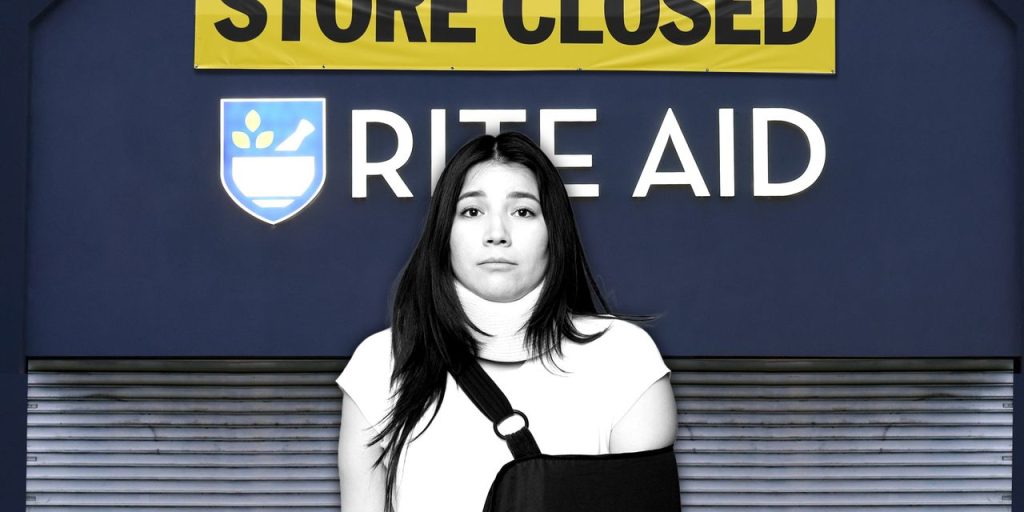In many parts of America, it’s easy to find a nearby pharmacy — but closing just one or two local pharmacies can easily disrupt Americans’ access to healthcare.
That’s a prospect more people are facing as both Rite Aid and Walgreens have announced store closures this year. Rite Aid
RAD
plans to close some of its approximately 2,100 stores while undergoing Chapter 11 bankruptcy. Rite Aid hasn’t said yet which stores will close.
The company has said it plans to restructure its debts and continue operations. The plan to close “certain underperforming stores” would decrease rent costs and strengthen the chain’s bottom line, the company said.
Rite Aid’s upcoming store closures come after the chain already shuttered more than 200 stores over the past two years, according to the Wall Street Journal. Earlier this year, Walgreens
WBA,
+0.31%
announced plans to close 150 U.S. stores out of nearly 9,000 locations.
“ ‘When patients don’t have access to pharmacists, that might mean that they have less access to healthcare and they have worse health outcomes.’”
Because of the healthcare role that pharmacies play — one that was on full display during the pandemic — people can acutely feel even a small drop in the number of pharmacies around them, according to the authors of a 2022 analysis from the University of Pittsburgh, University of Florida and the University of California, San Diego. The analysis mapped pharmacies nationwide and examined the potential impact of closures.
“The community pharmacy is this really pivotal and really foundational piece of our American health system,” said Lucas Berenbrok, an associate professor at the University of Pittsburgh’s Department of Pharmacy and Therapeutics. “When patients don’t have access to pharmacists, that might mean that they have less access to healthcare and they have worse health outcomes.”
There are more than 60,000 pharmacies throughout the country, including large retail chain operations like Rite Aid and independently-owned pharmacies, according to the 2022 analysis.
In fact, there’s a pharmacy within a five-mile drive for roughly 90% of Americans, the researchers determined. In large and small metropolitan areas, large retail chains accounted for over 60% of pharmacies, they noted.
Pharmacists are ‘increasingly important health care providers’
But pharmacies can play a key role in a community’s healthcare. One example: pharmacists administered more than 290 million COVID-19 vaccinations from December 2020 to November 2022, according to the American Pharmacists Association.
“[P]harmacists are becoming increasingly important health care providers, particularly for rural residents who may have limited access to other health services,” University of Pittsburgh noted in a statement about the 2022 analysis. Community pharmacies often do far more than dispense drugs; they can also screen for diseases, provide contraception, over-the-counter hearing aids and chronic disease management.
Slightly longer drives to a new pharmacy may not sound a major hurdle for drivers, but many city dwellers use public transit, he noted. Traveling that “extra block, or that next neighborhood over” may not fit with some time-pressed schedules — throwing up another barrier to medication picked up on time, or making a scheduled immunization shot, Berenbrok said.
Farther away pharmacies in rural counties present the same problem but in a different setting, he noted. While 99% of big city residents live within 10 miles from a pharmacy, it’s nearly 70% for rural residents, the study showed.
When pharmacies close, an outsize number tend to be independently-owned pharmacies, Berenbrok and other researchers showed. That tends to disproportionately impact Black and Latino city neighborhoods, and rural areas, said Serena Guo, an assistant professor at the University of Florida College of Pharmacy.
“Closure has the potential to worsen disparitites in access to pharmacies,” said Guo, who worked with Berenbrok studying pharmacy access.
Americans like their pharmacies
Another reason pharmacy closures could be tough for consumers? Many Americans are really attached to their current pharmacy for medication and assorted over-the-counter health needs. Between 70% and 80% of people said they are satisfied with their current pharmacy, according to research from the consulting firm McKinsey & Company.
Insurance coverage and proximity to one’s home or office were the top reasons why people choose a particular pharmacy, the report said.
The third most-cited driver was service, including speed filling prescriptions, the poll said. It’s reasonable to think wait times at remaining pharmacies can climb when nearby ones are closed, Berenbok added.
To be sure, Rite Aid acknowledges that store closures are no small inconvenience.
“The decision to close a store is not one we take lightly. In making it, we take into consideration the impact on our associates and the customers and communities we serve,” the company said in an explanation of the bankruptcy process to customers.
“For our customers, we will make every effort to ensure they have access to health services, whether at another Rite Aid or other nearby pharmacy. We will also aim to transfer associates to other Rite Aid locations where possible.”
The changing role of pharmacies
Rite Aid’s bankruptcy comes at a time when many pharmacies are trying to become destinations for medical care and not just places to fill a prescription.
Consumers sound open to the idea. Over 40% of people said they would be open to common illness treatment and other health services through their pharmacy, the McKinsey poll said.
For example, Walgreens was part of a 2022 deal in a tie up between two urgent care providers, VillageMD and Summit Health-CityMD.
Walgreens has a “goal to be the independent partner of choice, not just in pharmacy but also in healthcare services” so it is “creating the right network of stores in the right locations,” a spokesman told MarketWatch. “When faced with the difficult decision to close a location, several factors are taken into account, including our existing footprint of stores, dynamics of the local market, and changes in the buying habits of our patients and customers, among other reasons.”
Read the full article here
